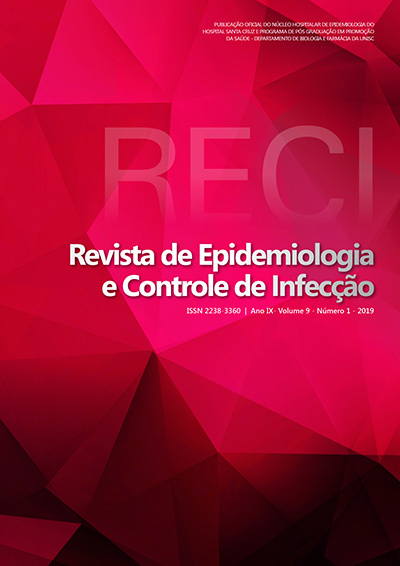Analysis of the health situation in high school: methodology
DOI:
https://doi.org/10.17058/reci.v9i1.11873Abstract
Background and Objective: In times of shortage of funding for research in Brazil, the cross-sectional study gains importance due to its advantages. The aim of this study is to analyze the study design on the health situation of secondary school students and analyze the school curriculum regarding the health promotion approach. Methods: This is a cross-sectional study. It was conducted in 24 schools (12 public and 12 private) of Teresina-PI, Brazil. Data were collected in the first semester of 2016 from 674 students, 281 teachers, and from political pedagogical projects of the schools. The municipality was divided into four geographic areas for the distribution of eligible schools for the study. They were sorted in three sizes in order to avoid sample crowding in the same area and size. A draw was made of six schools for each area with one of each size and type of management (public and private). Data from both students and teachers were collected through pre-tested questionnaires. Anthropometric and blood pressure measurements were taken from students, and were performed peripheral blood draw and finger prick blood sampling. Results: after refusal of 11 (1.61%) students, 434 students from public schools and 240 from private schools participated in the study; 281 teachers participated in the study. Conclusion: The cross-sectional design and strategies were adequate to the study, and was generated data that will allow the knowledge of several aspects of the health situation of secondary school students and the curricular approach on health promotion at this level of education. Keywords: School health. Cross-sectional studies. Epidemiologic studiesDownloads
Downloads
Published
How to Cite
Issue
Section
License
The author must state that the paper is original (has not been published previously), not infringing any copyright or other ownership right involving third parties. Once the paper is submitted, the Journal reserves the right to make normative changes, such as spelling and grammar, in order to maintain the language standard, but respecting the author’s style. The published papers become ownership of RECI, considering that all the opinions expressed by the authors are their responsibility. Because we are an open access journal, we allow free use of articles in educational and scientific applications provided the source is cited under the Creative Commons CC-BY license.


